九年级英语反义疑问句
- 格式:pdf
- 大小:1.50 MB
- 文档页数:14
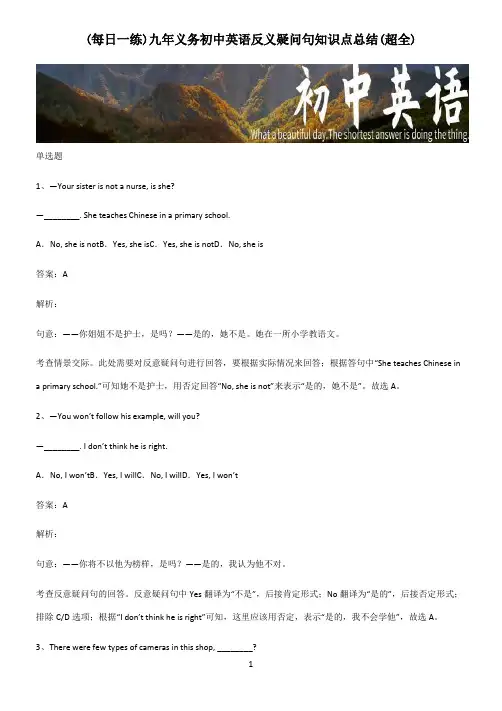
(每日一练)九年义务初中英语反义疑问句知识点总结(超全)单选题1、—Your sister is not a nurse, is she?—________. She teaches Chinese in a primary school.A.No, she is notB.Yes, she isC.Yes, she is notD.No, she is答案:A解析:句意:——你姐姐不是护士,是吗?——是的,她不是。
她在一所小学教语文。
考查情景交际。
此处需要对反意疑问句进行回答,要根据实际情况来回答;根据答句中“She teaches Chinese ina primary school.”可知她不是护士,用否定回答“No, she is not”来表示“是的,她不是”。
故选A。
2、—You won’t follow his exam ple, will you?—________. I don’t think he is right.A.No, I won’tB.Yes, I willC.No, I willD.Yes, I won’t答案:A解析:句意:——你将不以他为榜样,是吗?——是的,我认为他不对。
考查反意疑问句的回答。
反意疑问句中Yes翻译为“不是”,后接肯定形式;No翻译为“是的”,后接否定形式;排除C/D选项;根据“I don’t think he is right”可知,这里应该用否定,表示“是的,我不会学他”,故选A。
3、There were few types of cameras in this shop, ________?A.were thereB.weren't thereC.were theyD.weren't they答案:A解析:句意:这家店的照相机种类很少,________?考查反意疑问句。
这是there be句型,变反意疑问句时用be+there,排除C,D。
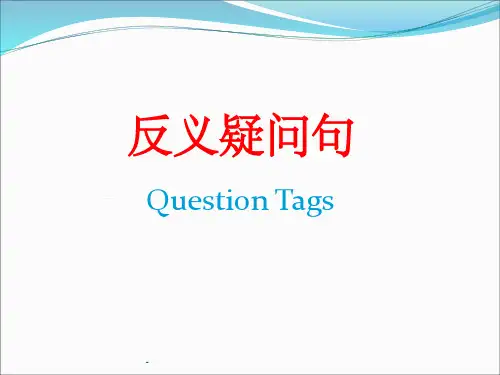
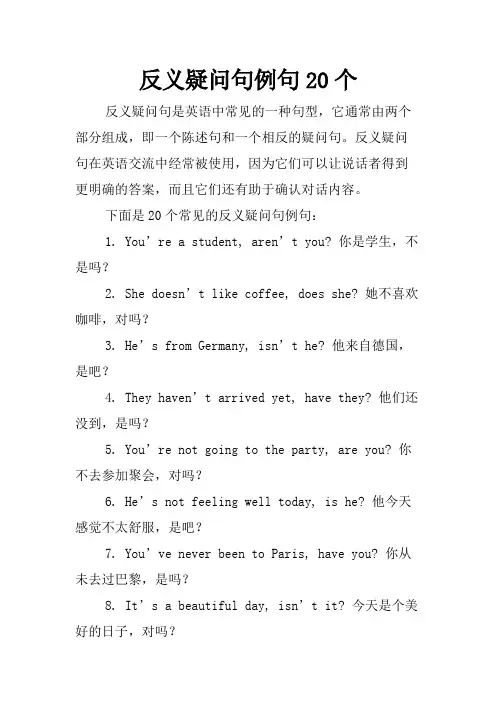
反义疑问句例句20个反义疑问句是英语中常见的一种句型,它通常由两个部分组成,即一个陈述句和一个相反的疑问句。
反义疑问句在英语交流中经常被使用,因为它们可以让说话者得到更明确的答案,而且它们还有助于确认对话内容。
下面是20个常见的反义疑问句例句:1. You’re a student, aren’t you? 你是学生,不是吗?2. She doesn’t like coffee, does she? 她不喜欢咖啡,对吗?3. He’s from Germany, isn’t he? 他来自德国,是吧?4. They haven’t arrived yet, have they? 他们还没到,是吗?5. You’re not going to the party, are you? 你不去参加聚会,对吗?6. He’s not feeling well today, is he? 他今天感觉不太舒服,是吧?7. You’ve never been to Paris, have you? 你从未去过巴黎,是吗?8. It’s a beautiful day, isn’t it? 今天是个美好的日子,对吗?9. He can’t swim, can he? 他不会游泳,对吗?10. She doesn’t like pizza, does she? 她不喜欢披萨,对吗?11. You’re not afraid of heights, are you? 你不怕高,对吗?12. They won’t be able to attend the meeting, will they? 他们不能参加会议,对吗?13. They’re leaving tomorrow, aren’t they? 他们明天要走了,对吗?14. He’s never been skiing, has he? 他从未滑过雪,对吗?15. She’s not going to the concert, is she? 她不去音乐会,对吗?16. You’re not worried about the exam, are you? 你不担心考试吧,对吗?17. He didn’t eat breakfast this morning, did he? 他今天早上没吃早餐,对吗?18. They’r e not going to the beach, are they? 他们不去海边,对吗?19. You’ve already seen the movie, haven’t you? 你已经看过这部电影了,对吗?20. He’s not coming to the party, is he? 他不来参加聚会,对吗?在使用反义疑问句时,需要注意的是,它们并不总是表示对话者的不确定或疑虑。
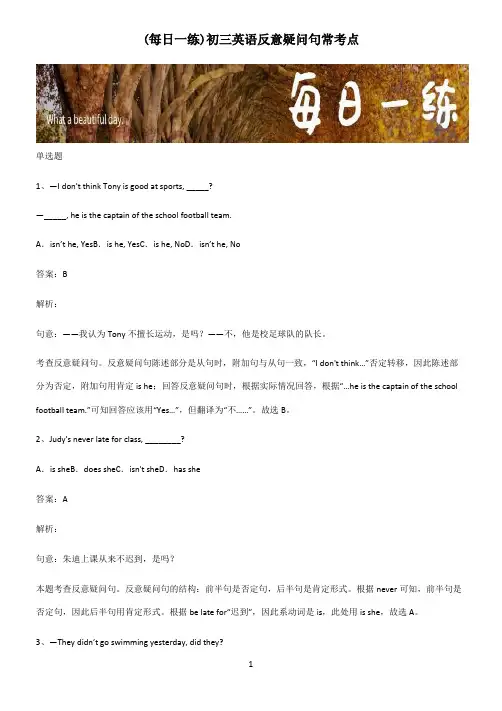
(每日一练)初三英语反意疑问句常考点单选题1、—I don't think Tony is good at sports, _____?—_____, he is the captain of the school football team.A.isn’t he, YesB.is he, YesC.is he, NoD.isn’t he, No答案:B解析:句意:——我认为Tony不擅长运动,是吗?——不,他是校足球队的队长。
考查反意疑问句。
反意疑问句陈述部分是从句时,附加句与从句一致,“I don't think…”否定转移,因此陈述部分为否定,附加句用肯定is he;回答反意疑问句时,根据实际情况回答,根据“…he is the captain of the school football team.”可知回答应该用“Yes…”,但翻译为“不……”。
故选B。
2、Judy's never late for class, ________?A.is sheB.does sheC.isn't sheD.has she答案:A解析:句意:朱迪上课从来不迟到,是吗?本题考查反意疑问句。
反意疑问句的结构:前半句是否定句,后半句是肯定形式。
根据never可知,前半句是否定句,因此后半句用肯定形式。
根据be late for“迟到”,因此系动词是is,此处用is she,故选A。
3、—They didn’t go swimming yest erday, did they?—_______ I saw them skate in the park.A.Yes, they did.B.No, they didn’t.C.Yes, they were.D.No, they weren’t.答案:B解析:句意:——他们昨天没有去游泳,是吗?——是的,他们没去。
我看见他们在公园里滑冰。
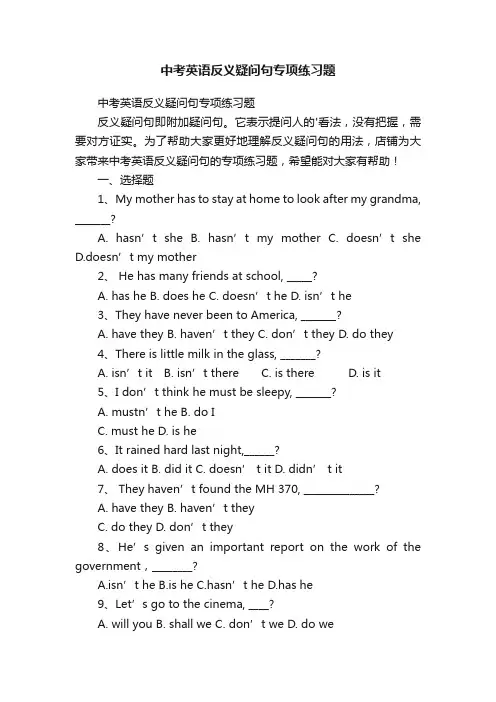
中考英语反义疑问句专项练习题中考英语反义疑问句专项练习题反义疑问句即附加疑问句。
它表示提问人的'看法,没有把握,需要对方证实。
为了帮助大家更好地理解反义疑问句的用法,店铺为大家带来中考英语反义疑问句的专项练习题,希望能对大家有帮助!一、选择题1、My mother has to stay at home to look after my grandma, _______?A. hasn’t sheB. hasn’t my motherC. doesn’t sheD.doesn’t my mother2、 He has many friends at school, _____?A. has heB. does heC. doesn’t heD. isn’t he3、They have never been to America, _______?A. have theyB. haven’t theyC. don’t theyD. do they4、There is little milk in the glass, _______?A. isn’t itB. isn’t thereC. is thereD. is it5、I don’t think he must be sleepy, _______?A. mustn’t heB. do IC. must heD. is he6、It rained hard last night,______?A. does itB. did itC. doesn’ t itD. didn’ t it7、They haven’t found the MH 370, ______________?A. have theyB. haven’t theyC. do theyD. don’t they8、He’s given an important report on the work of the government,________?A.isn’t heB.is heC.hasn’t heD.has he9、Let’s go to the cinema, ____?A. will youB. shall weC. don’t weD. do we10、Lucy didn’t come to school yesterday, ____?A. did sheB. didn’t sheC. dos sheD. doesn’t she11、There are a few people in the room, ____?A. are thereB. aren’t thereC. are theyD. aren’t the y12、He’s never been to a foreign country, ________?A. isn’t heB. is heC. has heD. hasn’t he13、Come here a moment, ____?A. will youB. shall youC. shall weD. don’t you14、They have never been to America, _______?A. have theyB. haven’t theyC. don’t theyD. do they15、She’s already back., _______?A doesn’t sheB isn’t sheC hasn’t sheD has she16、He’s never been to the Great Wall, __________?A. is heB. was heC. wasn’t heD. has he17、–There is little milk in the milk bag, ________ there?A. i sB. isn’tC. aren’t18、They seldom think about the people, __________?A. do theyB. don’t theyC. are theyD. aren’t they19、 Jim never copies your homework, _____ ?A. does JimB. doesn’t heC. does he20、Tommy has a pen, ?A. hasn’t heB. isn’t heC. doesn’t heD. wasn’t he21、 Alice had a wonderful time yesterday, ______?A. hadn’t sheB. wasn’t sheC. didn’t sheD. wouldn’t she22、The tall man over there is our new English teacher, _________?A. is heB. is thereC. isn’t heD. isn’t there23、―He har dly has any friends to play with , _____ he?―_______! That’s why he feels lonely from time to time.A. hasn’t, NoB. doesn’t, YesC. does, YesD. does, No24、----He’s never put his effort into his study before, he?---- . He does very badly in all his subjects.A. hasn’t, YesB. is, NoC. has, YesD. has, No25、He never goes to Yancheng, ______?A. doesn’t heB. is heC. isn’t heD. does he26、-----He’s never been to Canada before, _____? -----Sorry, I don’t know.A. is heB. has heC. isn’t heD. hasn’t h e27、—He hardly caught the train yesterday afternoon, he?— , because he was caught in the rain.A. did; Yes, he didB. didn’t; Yes, he didC. did; No, he didn’tD. didn’t; No, he didn’t28、—He’s never told lies,_________ he ? —__________,he’s an honest boy.A. is , NoB. isn’t , YesC. has , NoD. hasn’t , Yes29、They hardly hurt themselves in the accident last night, _________?A. don’t theyB. didn’t theyC. did theyD. do they30、--Let’s go shopping, _____?--Ok, let’s go.A. do youB. don’t youC. will youD. shall we31、The boy hardly ever goes swimming ,_____ _____ ?A doesn’t heB does heC has heD hasn’t he32、Don’t forget to give my dog some food and change her water, ______?A.will youB.do youC.won’t youD.shall we33、He has never been to Beijing, ______?A. hasnt heB. has heC. doesnt he34、 There is little left, ________ ?A. is itB. isn’t itC. isn’t thereD. is there35、You have to keep quiet while watching the film, _______ you?A. haven’tB. don’tC. didn’tD. will36、 This book cost her twenty yuan , ?A. didn’t itB. doesn’t itC. did itD. does it37、–There are always many volunteers in great events, ________?--Yes. Many hands make light work.A. are thereB. aren’t thereC. aren’t theyD. are they38、Ellen seldom goes swimming in the river alone, ____________ ?A. does heB. doesn’t heC. does sheD. doesn’t she39、—Rose, we will start at six tomorrow morning. Dont be late,______?—_______,Ill be there on timeA.wont you;Yes,I willB.will you;Yes,I willC.will you;No,I wontD.wont you,No,I wont40、I don’t think dropping litter is allowed in Yellow River Park, ________?A. do IB. is itC. isn’t itD. don’t I参考答案一、选择题1、C2、C3、A4、C5、D6、D7、A9、B10、A11、B12、C13、A14、A15、B16、D17、A18、A19、C。
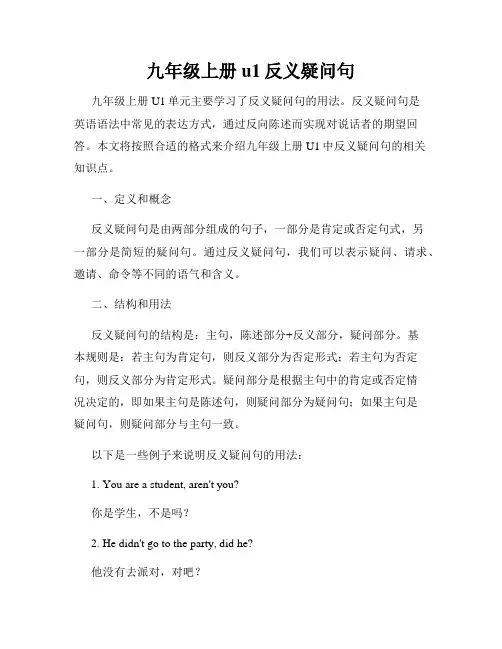
九年级上册u1反义疑问句九年级上册U1单元主要学习了反义疑问句的用法。
反义疑问句是英语语法中常见的表达方式,通过反向陈述而实现对说话者的期望回答。
本文将按照合适的格式来介绍九年级上册U1中反义疑问句的相关知识点。
一、定义和概念反义疑问句是由两部分组成的句子,一部分是肯定或否定句式,另一部分是简短的疑问句。
通过反义疑问句,我们可以表示疑问、请求、邀请、命令等不同的语气和含义。
二、结构和用法反义疑问句的结构是:主句,陈述部分+反义部分,疑问部分。
基本规则是:若主句为肯定句,则反义部分为否定形式;若主句为否定句,则反义部分为肯定形式。
疑问部分是根据主句中的肯定或否定情况决定的,即如果主句是陈述句,则疑问部分为疑问句;如果主句是疑问句,则疑问部分与主句一致。
以下是一些例子来说明反义疑问句的用法:1. You are a student, aren't you?你是学生,不是吗?2. He didn't go to the party, did he?他没有去派对,对吧?3. She can speak French, can't she?她会说法语,是吗?三、使用注意事项在使用反义疑问句时,需要注意以下几点:1. 若主句中包含情态动词,疑问部分则使用这个情态动词。
例如:He should go to the doctor, shouldn't he?2. 若主句中包含助动词或情态动词,疑问部分中只使用助动词。
例如:They have finished their homework, haven't they?3. 若主句中没有情态动词,疑问部分使用助动词do或does。
例如:She likes coffee, doesn't she?4. 当主句为否定句时,疑问部分用肯定形式。
例如:He doesn't like ice cream, does he?5. 当主句涉及“有”时,疑问部分使用do或does。
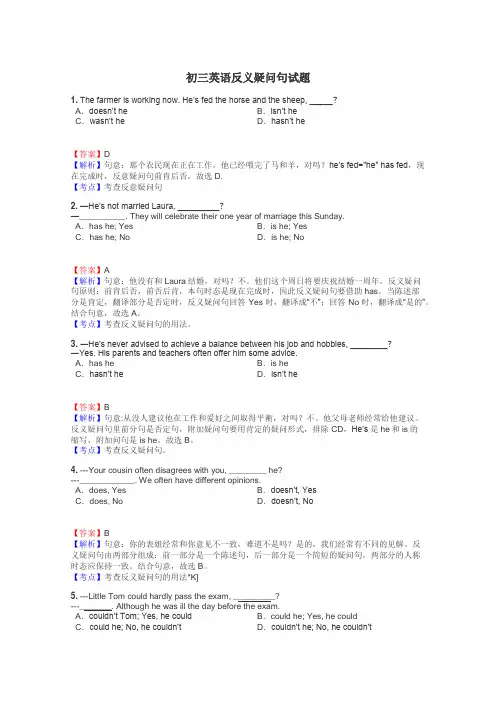
初三英语反义疑问句试题1.The farmer is working now. He’s fed the horse and the sheep, _____?A.doesn’t he B.isn’t heC.wasn’t he D.hasn’t he【答案】D【解析】句意:那个农民现在正在工作。
他已经喂完了马和羊,对吗?he’s fed="he" has fed,现在完成时,反意疑问句前肯后否,故选D.【考点】考查反意疑问句2.—He’s not married Laura, _________?—__________. They will celebrate their one year of marriage this Sunday.A.has he; Yes B.is he; YesC.has he; No D.is he; No【答案】A【解析】句意:他没有和Laura结婚,对吗?不。
他们这个周日将要庆祝结婚一周年。
反义疑问句原则:前肯后否,前否后肯,本句时态是现在完成时,因此反义疑问句要借助has。
当陈述部分是肯定,翻译部分是否定时,反义疑问句回答Yes时,翻译成“不”;回答No时,翻译成“是的”。
结合句意,故选A。
【考点】考查反义疑问句的用法。
3.―He’s never advised to achieve a balance between his job and hobbies, ________?―Yes. His parents and teachers often offer him some advice.A.has he B.is heC.hasn’t he D.isn’t he【答案】B【解析】句意:从没人建议他在工作和爱好之间取得平衡,对吗?不。
他父母老师经常给他建议。
反义疑问句里前分句是否定句,附加疑问句要用肯定的疑问形式,排除CD,He’s是he和is的缩写,附加问句是is he。

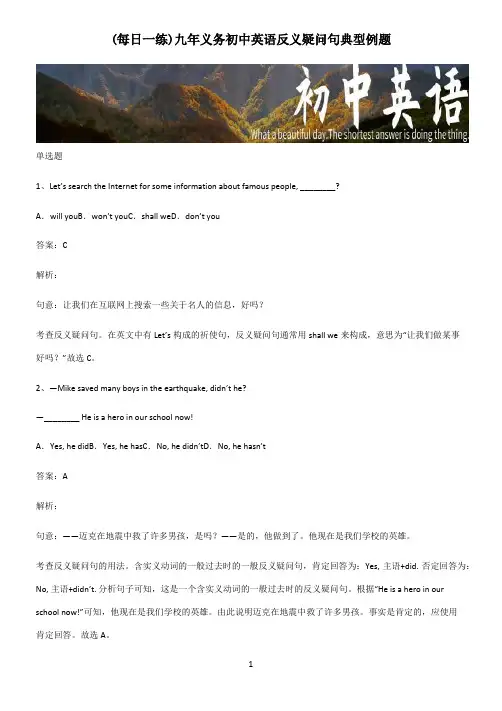
(每日一练)九年义务初中英语反义疑问句典型例题单选题1、Let’s search the Internet for some information about famous people, ________?A.will youB.won’t youC.shall weD.don’t you答案:C解析:句意:让我们在互联网上搜索一些关于名人的信息,好吗?考查反义疑问句。
在英文中有Let’s构成的祈使句,反义疑问句通常用shall we来构成,意思为“让我们做某事好吗?”故选C。
2、—Mike saved many boys in the earthquake, didn’t he?—________ He is a hero in our school now!A.Yes, he didB.Yes, he hasC.No, he didn’tD.No, h e hasn’t答案:A解析:句意:——迈克在地震中救了许多男孩,是吗?——是的,他做到了。
他现在是我们学校的英雄。
考查反义疑问句的用法。
含实义动词的一般过去时的一般反义疑问句,肯定回答为:Yes, 主语+did. 否定回答为:No, 主语+didn’t. 分析句子可知,这是一个含实义动词的一般过去时的反义疑问句。
根据“He is a hero in our school now!”可知,他现在是我们学校的英雄。
由此说明迈克在地震中救了许多男孩。
事实是肯定的,应使用肯定回答。
故选A。
3、It is a sunny day, _______?A.is todayB.isn’t todayC.is itD.isn’t it答案:D解析:句意:今天是晴天,不是吗?考查反意疑问句。
本句是反意疑问句,遵循“前肯后否”原则,谓语动词“is”要变为否定形式“isn’t”,主语为“it”,“isn’t it”表示“(它)不是吗”。
故选D。
4、They didn’t play volleyball the day before yesterday, _________?A.do theyB.don’t theyC.did theyD.didn’t they答案:C解析:句意:他们前天没有打排球,是吗?反意疑问句有两种句型:肯定陈述句+简略否定问句;否定陈述句+简略肯定问句。
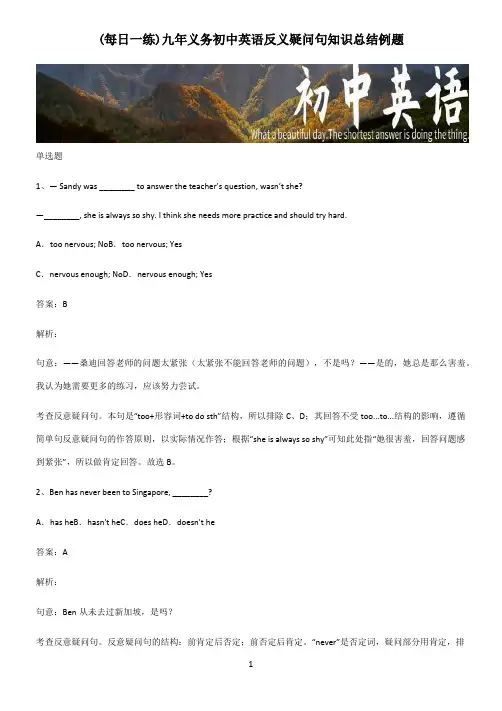
(每日一练)九年义务初中英语反义疑问句知识总结例题单选题1、—Sandy was ________ to answer the teacher’s question, wasn’t she?—________, she is always so shy. I think she needs more practice and should try hard.A.too nervous; NoB.too nervous; YesC.nervous enough; NoD.nervous enough; Yes答案:B解析:句意:——桑迪回答老师的问题太紧张(太紧张不能回答老师的问题),不是吗?——是的,她总是那么害羞。
我认为她需要更多的练习,应该努力尝试。
考查反意疑问句。
本句是“to o+形容词+to do sth”结构,所以排除C、D;其回答不受too...to...结构的影响,遵循简单句反意疑问句的作答原则,以实际情况作答;根据“she is always so shy”可知此处指“她很害羞,回答问题感到紧张”,所以做肯定回答。
故选B。
2、Ben has never been to Singapore, ________?A.has heB.hasn't heC.does heD.doesn't he答案:A解析:句意:Ben从未去过新加坡,是吗?考查反意疑问句。
反意疑问句的结构:前肯定后否定;前否定后肯定。
“never”是否定词,疑问部分用肯定,排除B和D选项。
陈述部分的助动词是has,肯定部分也用has,故选A。
3、He seldom asks others to assist him, ________ he?A.doB.doesC.doesn’tD.don’t答案:B解析:句意:他很少叫其他人帮助他,是么?考查反意疑问句。
反意疑问句由“陈述句+疑问尾句”两部分组成,第一部分提出看法,第二部分用来质疑或表示证实。
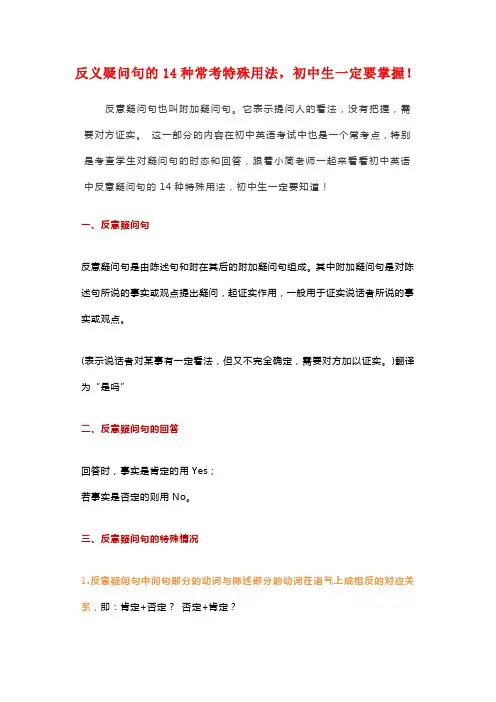
反义疑问句的14种常考特殊用法,初中生一定要掌握!反意疑问句也叫附加疑问句。
它表示提问人的看法,没有把握,需要对方证实。
这一部分的内容在初中英语考试中也是一个常考点,特别是考查学生对疑问句的时态和回答,跟着小简老师一起来看看初中英语中反意疑问句的14种特殊用法,初中生一定要知道!一、反意疑问句反意疑问句是由陈述句和附在其后的附加疑问句组成。
其中附加疑问句是对陈述句所说的事实或观点提出疑问,起证实作用,一般用于证实说话者所说的事实或观点。
(表示说话者对某事有一定看法,但又不完全确定,需要对方加以证实。
)翻译为“是吗”二、反意疑问句的回答回答时,事实是肯定的用Yes;若事实是否定的则用No。
三、反意疑问句的特殊情况1.反意疑问句中问句部分的动词与陈述部分的动词在语气上成相反的对应关系,即:肯定+否定?否定+肯定?You can’t do it, can you?你不能做它,是吗?They are very late for the meeting, aren’t they?他们开会迟到了,是吗?2.附加问句的主语应与陈述句的主语保持一致,且只能用人称代词替代。
You come from Beijing, don't you?你来自北京,是不是?3.当陈述句中含有be动词,助动词,或是情态动词时,反问句部分由这些词加上主语人称代词构成:Be动词包括:am, is, are, was, were助动词有:do, does, did, have(用在完成时), has(用在完成时)等情态动词有:can, could, may, might, must, will, would, shall, shouldHe will go home, won’t he?他要回家了,是吗?She doesn’t like to eat popcorn, does she?她不喜欢吃爆米花,是吗?4.have的不同用法,反义疑问句用不同的动词(1)have 表“有”时,反义疑问句谓语动词用have/do都行He has a new car, doesn’t/hasn’t he?(2)have表“吃,喝,玩,度过,举办”等是,反义疑问句谓语动词用doHe has supper at home every day, doesn’t he?They had a good time in Beijing, didn’t they?(3)have to表“不得不,必须”时,反义疑问句谓语动词用doKite has to help her mother, doesn’t she?(4)had better表“最好”时,反义疑问句谓语动词用hadWe had better go to school at once, hadn't we?(5)have用在完成时中,反义疑问句谓语动词用haveThey have known the matter, haven’t they?5.(1)反意疑问句的陈述部分带有little, few, never, hardly, seldom,nobody, nothing, no one, none, neither等否定意义的词时,问句部分用肯定式。
(每日一练)九年义务初中英语反义疑问句常考点单选题1、You’ll forgive him, ________?A.will youB.won’t youC.do youD.don’t you答案:B解析:句意:你会原谅他的,是吗?考查反意疑问句。
该句陈述部分为一般将来时,即“will +动词原形”结构,故反问部分也应用will,根据“前肯后否”的原则,故选B。
2、Bob has few friends in his new school, __________?A.hasn't beB.does heC.doesn’t he答案:B解析:句意:鲍勃在他的新学校几乎没有朋友,是吗?考查反意疑问句。
反意疑问句要做到“前否后肯”或“前肯后否”,根据题干中“has few friends”中few意为“极少,几乎没有”,表否定含义,可知疑问部分要用肯定形式,只有does he符合题意。
故选B。
3、They have no time to visit the museum, _______?A.do theyB.haven’t theyC.don’t theyD.will they答案:A解析:句意:他们没有时间参观博物馆,对吗?考查反意疑问句。
反意疑问句分两部分:前半部分是陈述部分,后半部分是疑问部分,并且遵循“前肯后否或前否后肯”的原则。
本句中前半部分是否定形式,且动词是行为动词have,主语是they第三人称复数,变一般疑问句要用do完成,后半部分应用肯定形式do they。
A. do they符合题意和语法;B. haven’t they助动词和否定形式均错误;C. don’t they否定形式错误;D. will they助动词错误。
故选A。
4、Everything begins to grow fast in spring, ________?A.does itB.do theyC.didn’t itD.doesn’t it答案:D解析:句意:万物在春天都在快速生长,不是吗?考查反意疑问句。
1 (每日一练)九年义务初中英语反义疑问句全部重要知识点 单选题 1、—There was little rain in your hometown last summer,____________ there? —_____________. Plenty of plants died in the field. A.wasn't; YesB.wasn't; NoC.was; YesD.was; No 答案:D 解析: 句意:——去年夏天你家乡很少下雨,是吗?——是的,许多植物死在地里。 考查反意疑问句。根据反意疑问句遵循“前肯后否,前否后肯”原则,由前面的little rain可知,后面要用肯定形式,排除A和B,当陈述部分是否定的,疑问部分是肯定的时,答句中Yes,翻译成“不”,No翻译成“是的”,由后面的句子Plenty of plants died in the field可知,应该说的是“是的”,排除C,故选D。
2、It is very hot outside, ________? A.it isB.is itC.doesn’t itD.isn’t it 答案:D 解析: 句意:外面很热,不是吗? 考查反意疑问句。反意疑问句应遵循“前肯后否,前否后肯”的结构形式,其前后两部分在人称、时态和数上都要保持一致。此句陈述部分是肯定句且谓语动词用的是be动词“is”,对应的疑问部分要用be动词的否定形式isn’t,故选D。 2
3、—Sam didn’t go to school yesterday, did he? —_______. He was ill yesterday. A.Yes, he did.B.No, he did.C.No, he didn’tD.Yes, he didn’t 答案:C 解析: 句意:——萨姆昨天没去上学,是吗?——是的,他没有。他昨天病了。 考查反意疑问句。反意疑问句的回答要根据实际情况,做了用Yes回答;没做用No回答。根据“He was ill yesterday”可知,他昨天没有去上学,排除A、D。B的回答又自相矛盾。选项C翻译为“是的,他没有去上学”。故选C。
中考英语反意疑问句
咱们在学习英语的过程中呀,会碰到一种很有趣的语法,叫反意疑问句。
啥是反意疑问句呢?给你们举个例子哈,就像“ You like apples, don't you? ”这句话,前面说“你喜欢苹果”,后面跟着个小尾巴“难道你不喜欢吗”,这就是反意疑问句啦,是不是挺好玩的?
那怎么来构成反意疑问句呢?这有个小规律哟。
如果前面的陈述句是肯定的,后面的小尾巴就得是否定的;要是前面陈述句是否定的,后面的小尾巴就得是肯定的。
比如说,“She is a student, isn't she? ”前面说“她是个学生”是肯定的,后面“难道她不是吗”就是否定的啦。
再看这个,“He can't swim, can he? ”前面说“他不会游泳”是否定的,后面“难道他会吗”就是肯定的哦。
还有呀,反意疑问句里的动词要根据前面陈述句里的动词来变哟。
像前面用的是“be动词”,后面小尾巴也用“be动词”;前面用的是“情态动词”,后面也用一样的“情态动词”。
就像刚才举的例子“ You like apples, don't you? ”前面用的是一般现在时的实义动词“like”,后面小尾巴就用“don't”啦。
那咱们在回答反意疑问句的时候呢,也要注意哦。
不管问题怎么问,咱们都要根据实际情况来回答。
比如说,别人问你“ You like ice cream, don't you? ”如果你喜欢冰淇淋,那就回答“ Yes, I do. ”要是不喜欢,就回答“ No, I don't. ”可别搞混啦。
多做一些练习题,多和反意疑问句交交朋友,慢慢地,你们就能轻松掌握它啦!加油哦!。